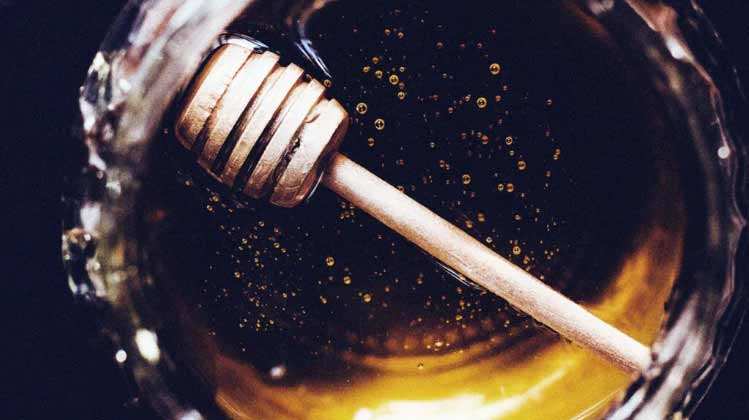
- A new study finds that honey, unlike other sweeteners, may actually be good for cardiometabolic health.
- The benefits of honey were revealed in studies of people who ate a heavy diet containing 10% or less sugar.
- The study suggests that honey — particularly raw, monofloral honey ‚ may be a healthier replacement for sugar already being consumed, rather than additional sweetener added to one’s daily intake.
Consider replacing the sugar you consume with honey, says a new study from researchers at the University of Toronto.
For people on a healthy diet in which no more than 10% of daily calories come from sugar, honey actually provides cardiometabolic benefits.
The study is a review and meta-analysis of the effects of honey in 18 controlled feeding trials involving 1,105 predominantly healthy individuals.
Taken together, the trials showed that honey lowered fasting blood glucose (blood sugar levels on an empty stomach), total and “bad” (LDL) cholesterol, as well as a marker of fatty liver disease. They also found that honey increased markers of inflammation.
While sugars of all kinds are associated with cardiometabolic issues — and honey is 80% sugar — the study’s authors suggest that honey may be in a category of its own, and worthy of special consideration as a healthy food.
The researchers found that raw honey and monofloral honey provide the most cardiometabolic benefit.
The study appears in Nutrition Reviews.
What Is Special About Honey?
Unlike most sweeteners, honey’s sweetening power does not come exclusively from common sugars, such as fructose and glucose.
Co-author of the study Dr. Tauseef Ahmad Khan, research associate at the Temerty Faculty of Medicine, University of Toronto, Canada, told Medical News Today:
“Around 15% of honey is made of dozens of rare sugars — e.g., isomaltulose, kojibiose, trehalose, melezitose, etc. — which have been shown to have many physiological and metabolic benefits including improving glucose response, reducing insulin resistance, and promoting [the] growth of bacteria associated with a healthy gut.”
In addition, said Dr. Khan, honey contains much more than sugars.
This includes, he said, “many bioactive molecules, including polyphenols, flavonoids, and organic acids that have an array of pharmacological properties including antibiotic effect, anti-cancer effect, anti-obesogenic [anti-obesity] effect, protection against free radical damage and reducing inflammation, etc.”
Endocrinologist Dr. Ana Maria Kausel, who was not involved in the study, told MNT that she would nevertheless prefer the focus remain on reducing the intake of sugar.
“I think the focus should be more towards having less sugar overall in the diet. The benefits were seen after consuming an average of 40 grams for 8 weeks. This amount of sugar is more than what the body can process without involving the liver. We can see similar benefits in [cardiovascular] and metabolic risks without the sugar intake, for example, the Mediterranean diet,” she pointed out.
Raw Honey And Monofloral Honey
Honey products are frequently pasteurized — raw honey is not.
Honey is pasteurized for convenience, not safety, since the processing slows honey’s naturally occurring granulation, which can make it harder to pour out of a squeeze bottle or measure into a spoon.
Raw honey has an array of nutrients, including many antioxidants, which may diminish in quantity with pasteurization.
The current study found that raw honey had a particularly positive effect on fasting glucose.
Most honey is polyfloral, meaning that the bees that produce it collect nectar from any nectar-producing plants within a 2-to-4-mile range from their hive.
A monofloral honey is one that is derived exclusively from the bee-collected nectar of a single type of plant, or even a single plant.
Well-known monofloral honeys include Tupelo honey — from White Ogeechee Tupelo trees — clover honey, robinia honey, and French lavender honey. Each has a distinctive flavor.
The researchers found that clover and robinia monofloral honeys lowered LDL cholesterol and overall cholesterol, as well as fasting triglycerides. Clover honey also reduced fasting glucose levels.
Inflammation Markers
Excessive inflammation is increasingly associated with a variety of illnesses and conditions, so the study’s finding that honey raised inflammation markers IL-6 and TNF-alpha may give rise to some concern.
However, Dr. Khan suggested that an increase in these markers may actually indicate additional benefits.
“IL-6 may play a role in maintaining good glucose control by improving whole body metabolism of both glucose and lipids,” he said. “Similarly, TNF-alpha is an indicator of innate body immune response, so an increase with honey intake may suggest improved immunity.”
Considering Other Natural Sweeteners
“I am interested,” said Dr. Khan, “in all natural sweeteners, and plan to look at maple syrup and, of course, agave syrup. However, there is a major difference between these syrups and honey.”
“Syrups like maple syrup and agave are directly obtained from plants, with some processing by humans using heat, and are mainly composed of common sugars like fructose, glucose, and sucrose,” he added/
As Dr. Kausel put it, “agave is natural, but it’s fructose at the end of the day.“
“High fructose concentrations,” she pointed out, “are bad for the liver, no matter what the source is. Even natural juices are harmful for the liver, despite all the vitamins and minerals they might contain.”
Still, the way honeybees make honey adds an interesting twist that make its sugars different.
“Honey,” explained Dr. Khan, “has an additional step whereby the honeybees extensively process nectar [which is mainly sucrose] from flowers with their enzymes, which results in a large variety of rare sugars being produced in honey. These rare sugars are the key to the benefits of honey sugars over other natural sugars.”
Important Notice: This article was originally published at www.medicalnewstoday.com by Robby Berman where all credits are due. Fact checked by Ferdinand Lali, Ph.D.
Disclaimer
The watching, interacting, and participation of any kind with anything on this page does not constitute or initiate a doctor-patient relationship with Dr. Farrah™. None of the statements here have been evaluated by the Food and Drug Administration (FDA). The products of Dr. Farrah™ are not intended to diagnose, treat, cure, or prevent any disease. The information being provided should only be considered for education and entertainment purposes only. If you feel that anything you see or hear may be of value to you on this page or on any other medium of any kind associated with, showing, or quoting anything relating to Dr. Farrah™ in any way at any time, you are encouraged to and agree to consult with a licensed healthcare professional in your area to discuss it. If you feel that you’re having a healthcare emergency, seek medical attention immediately. The views expressed here are simply either the views and opinions of Dr. Farrah™ or others appearing and are protected under the first amendment.
Dr. Farrah™ is a highly experienced Licensed Medical Doctor certified in evidence-based clinical nutrition, not some enthusiast, formulator, or medium promoting the wild and unrestrained use of nutrition products for health issues without clinical experience and scientific evidence of therapeutic benefit. Dr. Farrah™ has personally and keenly studied everything she recommends, and more importantly, she’s closely observed the reactions and results in a clinical setting countless times over the course of her career involving the treatment of over 150,000 patients.
Dr. Farrah™ promotes evidence-based natural approaches to health, which means integrating her individual scientific and clinical expertise with the best available external clinical evidence from systematic research. By individual clinical expertise, I refer to the proficiency and judgment that individual clinicians acquire through clinical experience and clinical practice.
Dr. Farrah™ does not make any representation or warranties with respect to the accuracy, applicability, fitness, or completeness of any multimedia content provided. Dr. Farrah™ does not warrant the performance, effectiveness, or applicability of any sites listed, linked, or referenced to, in, or by any multimedia content.
To be clear, the multimedia content is not intended to be a substitute for professional medical advice, diagnosis, or treatment. Always seek the advice of your physician or other qualified health providers with any questions you may have regarding a medical condition. Never disregard professional medical advice or delay in seeking it because of something you have read or seen in any website, video, image, or media of any kind. Dr. Farrah™ hereby disclaims any and all liability to any party for any direct, indirect, implied, punitive, special, incidental, or other consequential damages arising directly or indirectly from any use of the content, which is provided as is, and without warranties.








